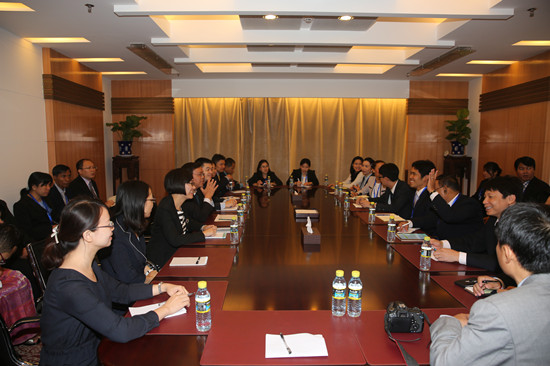
The delegation of officials from Mekong countries, upon the invitation of ASEAN-China Centre (ACC), had a series of visits and exchanges in Beijing from 21 to 23 September 2015.

After attending the welcoming ceremony on 21 September 2015, the delegation visited the Ministry of Foreign Affairs of China and had an in-depth exchange with Mr. Huang Xilian, Deputy Director-General of Asian Affairs Department. Mr. Huang briefed China’s policy on ASEAN, the latest development of ASEAN-China relations, and the progress and ideas on promoting Lancang-Mekong Cooperation. He emphasized that China attached great importance to ASEAN-China relations. China supported the building of ASEAN Community, the central role of ASEAN in regional cooperation, and a bigger role of ASEAN in regional and international affairs. ASEAN-China Strategic Partnership entered the Diamond Decade and ASEAN and China would celebrate the 25th anniversary of ASEAN-China dialogue relations in 2016. ASEAN-China cooperation had a vast prospect in the future. He said that the establishment of Lancang-Mekong Cooperation Mechanism was proposed by Chinese Premier Li Keqiang at the 17th ASEAN-China Summit in 2014 and received positive response from Mekong countries. China and Mekong countries were good neighbours with traditional friendship, geographic proximity and similar culture. There were unique advantage for both sides to cooperate in the fields of connectivity, people-to-people exchanges, etc.. The relevant countries should join hands to achieve bigger progress in promoting Lancang-Mekong Cooperation, and contribute to ASEAN-China relations. The delegation expressed its appreciation for the support from the Ministry of Foreign Affairs of China. Both sides also exchanged views on the relations between Lancang-Mekong Cooperation Mechanism and other existing sub-regional mechanisms and “One Belt One Road” initiative, as well as the possibility of cooperation among China, Japan and ROK in the region.

The delegation visited Beijing Language and Culture University (BLCU) and was warmly received by BLCU. Mr. Wang Luxin, Vice President of BLCU, briefed the history and major international cooperation of BLCU, especially its exchanges with Mekong countries. He stated that BLCU had prominent advantages in research and teaching of language and culture. BLCU would like to set up more courses on non-common languages of ASEAN countries, further strengthen its education cooperation with Mekong countries and welcome more students in the region to study and exchange atBLCU. The delegation also learned about the development of BLCU’s Collaborative Innovation Centre for China’s Neighboring Languages and Cultures. They were deeply impressed by the visit and expected BLCU to support more students of Mekong countries to study at BLCU. They hoped to maintain close contacts and exchanges with BLCU.
The delegation visited ACC in the afternoon. They were briefed by ACC officials on the main functions and recent activities of ACC, and toured the exhibition hall. During the working dinner, the delegation had further exchanges with ACC officials. They regarded the visit as a good opportunity to understand the roles of ACC in promoting ASEAN-China functional cooperation in the areas of trade, investment, education, culture, tourism, information, etc..
On 22 September 2015, the delegation visited International Poverty Reduction Centre in China (IPRCC) and the Institute of Plant Protection (IPP) of Chinese Academy of Agricultural Sciences (CAAS). Mr. Li Shaojun, Director of International Cooperation Division of IPRCC introduced IPRCC’s main functions and its recent poverty reduction programmes in Mekong countries, and shared its experiences and ideas in poverty reduction and raising the income of poor farmers. Officials from Laos, Cambodia and Myanmar expressed that poverty reduction was an important task of their countries and would like to have exchanges and cooperation with IPRCC. Experts from IPP introduced its joint programmes on agricultural plants protection along the “One Belt One Road”, as well as its joint programmes with Myanmar and Laos on prevention of grain pests.
The delegation also visited the terminal of South-to-North Water Diversion Project, the Summer Palace, Mutianyu Greatwall, and enjoyed Beijing Opera in Laoshe Teahouse. Through these visits, they had a better knowledge of hydro-project construction in China and Chinese history and rich tourism resources. They thanked ACC for its thoughtful arrangements of the schedule and extensive areas of the visits. They were satisfied with receiving so many useful information and unforgettable memories.